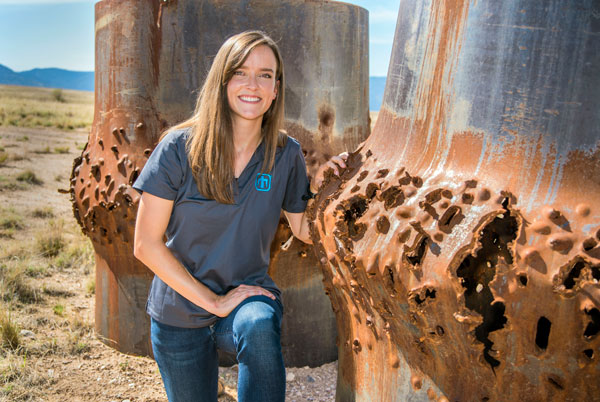A civil engineering student returns to Sandia each summer for love of community, mountains and explosions
If you didn’t know better, you’d think Rebecca Nylen had a terrible start to her summer internship.
She didn’t understand the work her group did. She had to be escorted everywhere because she worked in a tech area without a clearance. She tried picking up trail running, but fire restrictions closed the trails. When she joined a group of interns on a mountain climbing trip to Colorado, she tripped and broke her ankle.
But none of that mattered, she said. At least not compared to what she loved about the Labs — supportive people, world-class technology, Southwest sunsets. As she completes her second summer internship, she has every intention of returning to Albuquerque in 2019.
“I mean, it’s Sandia,” she said, surveying a bulging, six-foot-tall steel cylinder deformed from explosives.

Rebecca and her team sacrifice cylinders and other objects to refine the accuracy of computer simulations of damaging blasts, part of a field known as computational shock physics. But as a doctoral candidate in civil engineering at Georgia Tech, she’s more of an experimentalist, pummeling materials like reinforced concrete with high-powered actuators to study how the materials deteriorate and how to improve their post-impact strength.
It took about a month, she said, to feel comfortable with the entirely new skills and computational techniques, but her teammates throughout the computational structural mechanics organization played a key role aiding her ascent along a steep learning curve.
“Rebecca brings a number of positive qualities to our team,” said Russ Teeter, Rebecca’s Sandia mentor. “She is self-motivated and excited to learn, while her background in civil engineering helps us when modeling blast effects on concrete.”
Her expertise, he added, “fits into a number of Sandia mission spaces where it is important to understand the residual capacity of a structure after it has been subjected to blast or other damaging loads.”
Now fluent in CTH, a widely used software tool for modeling the behavior of explosives, Rebecca enjoys chatting with developers, picking their brains about material characteristics and how they’re represented mathematically. CTH was developed at Sandia, so the developers are always nearby to discuss the code. She can’t do that for the commercial software she uses at Georgia Tech.
“Show interest in a subject, and there will be experts who will help you learn it.”
“Extending the network of sharing between academia and the national labs is important,” said Rebecca’s Ph.D. adviser Lauren Stewart, assistant professor in the School of Civil and Environmental Engineering at Georgia Tech, “and Rebecca will be able to return to Georgia Tech with new knowledge that she can share with our entire research lab. I look forward to her experiences and approaches stimulating new ways of thinking for our group.”
And that’s exactly what Rebecca plans to do. Civil engineering, she says, is largely driven by observation, but that makes certain scenarios hard to plan for. If you want to study a structure in an earthquake, you have to wait for an earthquake, and for obvious safety reasons, you can’t intentionally build a bridge that will fall apart to study its weak points, or violate building codes to experiment with new materials or techniques.
But a computer model can reveal ways to improve roads, bridges and other infrastructure in ways that are otherwise difficult to observe. Rebecca aims to combine her experimental and computational perspectives to propel her field. “I’d like to advance the state of computational abilities for civil engineering structures.”
Rebecca’s ankle has long since healed. In fact, she used it to reach the summit of nine Rocky Mountain peaks this summer. Next year, she wants revenge on Mt. Elbert, the expedition on which she broke her ankle. She’s also found it handy for escorting new, uncleared interns. Her advice to them: “Show interest in a subject, and there will be experts who will help you learn it.”
If you’re here next summer, Rebecca may be that expert.